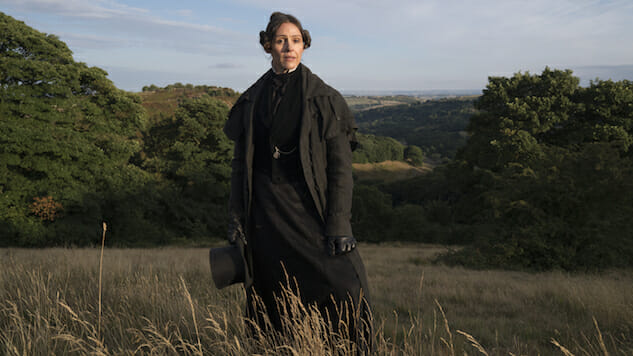Suranne Jones Delivers a Can’t-Miss Performance in Gentleman Jack
Photo: Aimee Spinks/HBO
Gentleman Jack is drawn from the extensive (some four million pages) journals of Anne Lister, a landed class Yorkshire woman widely considered to be the first “modern lesbian” known to history. Those diaries exhaustively detail her rather audacious life as a world traveler, coal magnate, landlord, mountaineer, and “Parisian,” which seems to be a common shorthand in 19th-century Halifax for “avid seducer of other women.” The series focuses on a timeframe in the 1830s dominated by Lister (Suranne Jones) returning to her family home in Yorkshire and setting her sights on nervous heiress Ann Walker (Sophie Rundle) as a companion.
Jones strides into the pilot like a sort of butch, handsome Mary Poppins, her mannish sartorial sensibility subverted by a massive, completely luminous smile. Her demeanor is the kind that in contemporary parlance might be described as “not giving one single solitary fuck,” but that’d be inaccurate. Anne Lister does absolutely give a fuck: Just not about what society mindlessly demands of her based on her sex. She’s a sincere Anglican who believes in God. She’s a woman of significant intellect who values education for its own sake as well as for practical worldly purposes. She’s an avid romantic who is seriously pained by the societal norms that make it especially hard for her to have an authentic love life. She cares about her family (probably even about her younger sister Marian, played with delightfully dour old-maidishness by Gemma Whelan). She cares about her tenants. She’s not a saint and she’s not without class-blinders; she’s vocal about her feeling that there’s no point to working-class people having the vote and it takes four episodes for her to even notice her maid is pregnant. But when a carriage accident maims the son of one of her tenant farmers she has a sustained keenness to deal with it and get whatever justice the kid can reasonably get. She exudes intelligence and canniness and competence and a general lust for life that flies in the face of everything you think of as Victorian womanhood. These qualities magnetize a lot of people. And threaten the hell out of others. I guess the good news about being a relentlessly polarizing character is you usually don’t have to question where you stand with people. The rest of the news, though, is that half of them will actively work to prevent you getting what you need.
In many ways, Gentleman Jack is a classic Victorian love story, full of slow pacing and drawing rooms; sequestered, cosseted ladies and scrappy servants; corsets and hoopskirts; seemingly insurmountable divisions of sex and class. There’s a greedy, dishonest industrialist and a love forbidden by the repressive mores of the day. The variable is Lister, who is female. This basically makes everything she does shocking and controversial and weird, whether it’s collecting her tenants’ rents on her own or walking without an escort or firing a drunk laborer or playing hardball over the cost per acre of leasing a coal mine. Or begging for the hand of a wealthy young woman. But this story isn’t merely about how putting a woman in a generally male context makes us feel surprised or causes us to confront unconscious prejudice, though I suppose those things might also happen. What stands out for me is how destabilized we are with respect to our faith in the characters’ intentions. That seriously brought me up short. I had periods of doubting several primary characters’ motives, including Lister’s. Was she manipulating Walker or was her interest sincere? Was it a calculated attempt to take advantage of a delicate younger woman for her money? Did Anne Lister simply have a compulsion to seduce vulnerable people? With Walker it got even weirder. Was she secretly queer as well? Was her fascination with Lister genuine? Was she working the older woman over for some massively unsavory reason? She was clearly lying or at least not telling the whole truth about certain things; was that fear or something nastier? Wait, is there anything nastier than fear? Honestly, it seems like fear underlies most of the cruelty on earth.